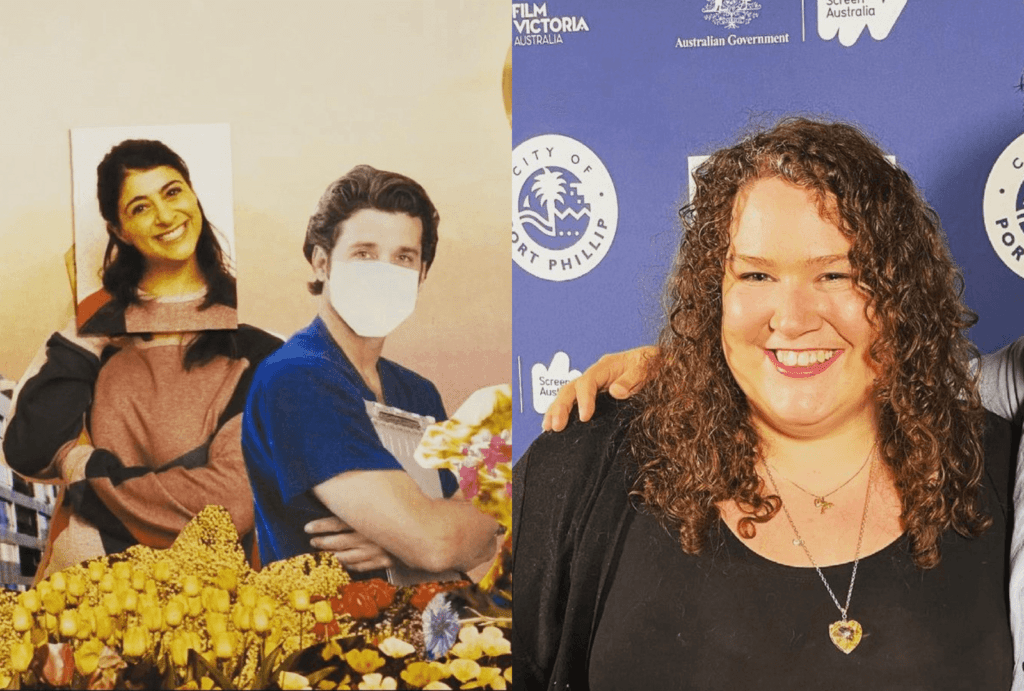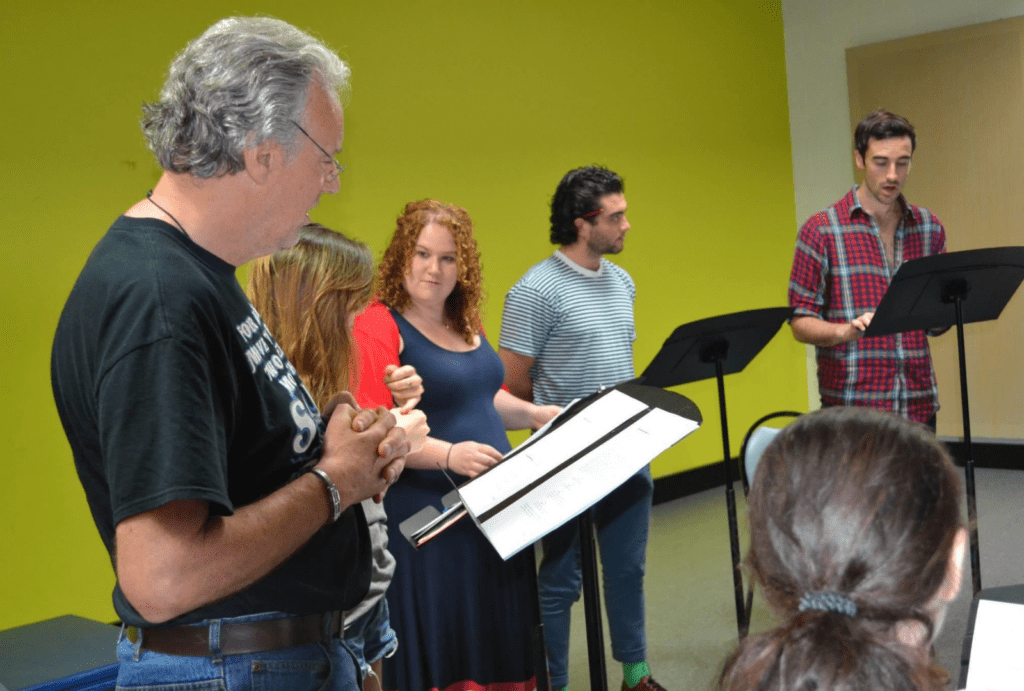NIDA alumna Jessica Marshall (Writing, 2015) is a passionate storyteller whose journey from the science lab to the writing room is a testament to following one’s creative calling. Since her time at NIDA, her flourishing career has seen her working on several screen projects including scripting for such shows as Neighbours, The Wrong Girl, Jack Irish and Netflix’s upcoming series Apple Cider Vinegar. Jessica shares valuable insights into her writing process, collaborative experiences, and the ever-changing landscape of television and film.
Did you always want to pursue a creative career? What Initially drew you to writing?
My mother likes to tell me that I was writing and illustrating my own stories before I even started school. As a child and teen, I always had my nose in a book or pen in my hand, writing in my diary or concocting stories and forcing living room performances on my family and unsuspecting guests. My mum always encouraged my creativity from a very young age, and throughout my schooling insisted I should be a writer. So naturally I ignored her. I was hell-bent on becoming a doctor, and by first year university in a science degree where I was repeatedly told my essays and assignments were too creatively written, I finally relinquished my rebellion and heeded my mother’s advice. Thanks mum.
Can you tell us why you chose to study Writing at NIDA?
After finishing my undergrad and Honours in Film, I embarked on a year of making my own very DIY short films, entering short film comps and basically inveigling myself on to indie film sets in whatever capacity I could. When I considered my next steps, I looked to the best courses where I could continue developing my skills. I chose the Master of Fine Arts in Writing for Performance because I was excited to learn holistically about my writing craft.
Can you talk about some of your highlights while studying at NIDA and some skills you have taken with you?
NIDA was a great crash course in collaboration with artists from all walks of life, and that was invaluable preparation for my career. Writing, whilst a solitary activity, is just the very beginning of the process of filmmaking or theatre-making. Processes which rely on people with great talents and varied skills coming together to make something bigger than themselves. I feel like NIDA was one of my first tastes of that process and I loved it. It is also where I met my best friends, and my creative soul mates, many of whom I continue to collaborate with and creatively confide in.

Can you walk us through your writing process when developing a new script? How do you approach brainstorming, outlining, and drafting?
I wish I had a step-by-step guide for a successful process, that would make life a lot easier! The truthful answer is that while there are certain things I gravitate and repeat every time I start a new work, it’s more often than not dependent on what the project is, and what the external demands may be. Generally in TV writing, there is quite a set process where you have likely been in a writer’s room and generated a lot of content together with other writers, and then from there you will work up a scene breakdown from that room, and then you will get notes on that scene breakdown, and then move into a first draft stage and so on. But right now for example, I am adapting from existing intellectual property for a film project and so that involves a lot of analysis of the source material, breaking it down, and then brainstorming and looking for new ways to transform the material to suit our needs and new format. The only guarantees in a writing process are procrastination (sometimes you get lucky and procrastination takes the form of cleaning or baking or exercise! I like to call this back brain thinking – where it looks like you aren’t doing the thing but really, you’re giving yourself space to let your subconscious do the work of bringing forth the gold) and revision. Writing is rewriting. Over and over and over again. There are no shortcuts!
What are some credits that you are most proud of since graduating and how did NIDA help you prepare for them?
I’m very fortunate to have worked across the changing landscape of TV and filmmaking in this country. I’ve cut my teeth on a lot of network shows and learned the lightning fast processes of network TV, but I’ve also been lucky to work with the streamers here and overseas – especially as the way we create content is constantly changing. My learnings at NIDA helped me prepare to be flexible and fast. I’ve just wrapped on a project for Netflix called Apple Cider Vinegar and it was a thrilling and challenging experience and I can’t wait to share it with the world later in the year.
Can you discuss your experience collaborating with other writers, showrunners, and production staff to bring a script to life?
Honestly, working with other insanely smart, talented writers and filmmaking practitioners is the cherry on top of being a screenwriter. Every single show I’ve ever worked on, I’ve had moments of just total awe of how bloody cool it is when people can come together with their specialties and individual creative thinking to find the most amazing creative solutions, visions and directions together. It’s not always a smooth path, the flip side of having a lot of smart, dedicated, creative people in a room is that there can be a lot of opinions and high-running emotions. But even in those moments of hardship there is always learning to be had. Remaining open-minded, and constantly curious about other people’s processes and thinking is a rich and inspiring way to work and the best writers and filmmakers approach their work and each other with these attitudes.

Television series often have ongoing story arcs and character development. How do you balance the need for episodic storytelling with the larger narrative arcs of a series?
That is the magic trick of television! I think the best answer is really that this comes with experience. Experience and a lot of writing and rewriting. Generally, a show will have an extensive brainstorm with many writers to create a solid and tight series arc in development. Further development involves breaking down that overall arc into each episode and then further again into each character’s arc. Getting the balance right for each character, each episode and how it feeds into the overall structure, is a fine art that is almost always a work in progress.
What television series or writers have influenced your style and approach to scriptwriting?
My sources of inspiration are always in flux and not limited to TV. My tastes are quite genre-bending and ever-changing. My love for Nora Ephron’s (Sleepless in Seattle, 1993. Julie & Julia, 2009) writing is a constant. I read Raymond Carver (Cathedral, 1983. Where I’m Calling From, 1988.) collections every year for reminders on how to be as succinct as possible. I return every year to Wuthering Heights (Emily Brontë, 1847) to stoke my inner sad gothic witch girl. I aspire to the authorial control and cleverness of Mike White (School of Rock, 2003. The White Lotus, 2021). Ditto for Samantha Strauss (Dance Academy, 2010. Nine Perfect Strangers, 2021) who is an incredible inspiration and someone I’m lucky to work with. I am almost always rewatching 30 Rock and Tina Fey for her unhinged brand of comedy. I think Sharon Horgan (Catastrophe, 2015. Motherland, 2017.) is the coolest. Shonda Rimes (Introducing Dorothy Dandridge, 1999. Grey’s Anatomy, 2005) is a queen. And whenever Melissa Broder (The Pisces, 2018. Milk Fed, 2021) releases a new novel I will inhale it and marvel at her exquisite weirdness.

What advice would you give to aspiring writers, especially those thinking of studying the MFA of Writing for Performance at NIDA?
It’s the simplest advice, yet the hardest to put into practice and it is: just write. Write every day. Even if it’s just half a page of stream of consciousness. Read things. Watch things. Absorb from the best, but don’t get disheartened or try and compare yourself or your voice to other writers (this is almost always impossible, but try). Make things. Film things. Always celebrate completing a first draft, but know that it is just the first step in the life of a project and the work is just beginning. Know that you will almost always question yourself and your path, but never doubt your voice or your gut instinct. And most importantly to survive as a writer, to survive the film and television industry, you must get comfortable with failing! You will fail more than you will succeed and that’s just part of the process.
What’s next for you?
I’m currently writing a film for a UK/Australian company, a kind of post-happily-ever-after romantic comedy, which is a lot of fun. I also have a few really fun writer’s rooms coming up soon as well as being in various stages of development and funding of my own film and TV slate. So stay tuned!
*This degree is now named Mater of Fine Arts in Dramatic Writing
